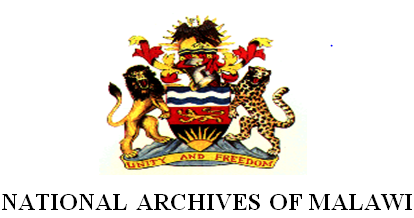
Guide to conducting archival research
This guide uses the National Archives of Malawi as a reference, with application to social work and development research.
Introduction to archival research
Archival research is a qualitative method involving the location, evaluation, and interpretation of historical documents and records preserved in archives. It is especially valuable in social work and development research, where understanding historical policies, institutional responses, and patterns of social change is essential. This approach is recognised by scholarly platforms, including the African Journal of Social Work and Nyingi yaUbuntu/Journal of Ubuntu, both of which accept archival research manuscripts as original contributions to knowledge. This guide outlines a methodological approach to archival research, using the National Archives of Malawi as a reference, and with application to researchers working in social and development fields.
Methodological steps
1. Identifying the archive
Researchers in social work and development often rely on understanding how past state interventions, welfare policies, community development programmes, or colonial administrative frameworks were implemented and received. The National Archives of Malawi is highly relevant for this purpose. It is located in Zomba, in the Southern Region of Malawi, and is administered by the Department of Antiquities under the Ministry of Tourism, Culture and Wildlife. The archive houses government records, missionary correspondences, social service files, newspapers, maps, oral histories, and other primary materials essential for contextualising social and developmental issues across different time periods.
2. Preparing for the visit
Before visiting the archive, it is advisable to contact the institution to confirm access procedures, opening hours, and any special permissions required. Researchers should define their objectives in advance and identify key themes or issues—such as child welfare, local governance, public health, or community development—that guide their document search. If available, reviewing catalogues or finding aids beforehand can save time and improve the focus of your visit.

3. Describing the archive
In your methodology, include a short description of the archive and its relevance to your topic. The National Archives of Malawi serves as a custodian of both colonial and post-independence administrative records, including reports from various government departments, district offices, and mission-based institutions. Its materials are typically organised by department, date, or theme, allowing for systematic tracing of policy developments and institutional responses to social issues. This structure supports research into historical aspects of social work practice, education, gender, and indigenous community development.
4. Locating documents
On-site, researchers should use reference guides and, where possible, consult archivists to locate relevant documents. Important details to record include the collection title, reference code, box or file number, document title, and date range. For instance, a researcher interested in colonial education policies might examine the “Education Department Files” with a reference like NA/MWI/ED/1954/003. Other useful sources might include minutes from local development committees, welfare reports, correspondence between local leaders and officials, and project evaluations from the 1960s to the 1980s.
5. Documenting the time period of your visit
It is important to record when the archival research was conducted. For example:
Archival research was conducted at the National Archives of Malawi from 10 June to 28 June 2025. During this period, materials related to colonial-era social welfare records, rural development projects, and early post-independence child protection reports were consulted.
6. Handling and recording data
Documents should be handled carefully and according to the archive’s policies. If photography or scanning is permitted, these can be used to support later analysis. If not, researchers should take thorough notes, transcribe important sections, and maintain a research log detailing reference numbers, titles, dates, and relevant content. Where relevant, it is also helpful to reflect on the condition of materials or noticeable gaps in the archival record.
Ethical and referencing considerations
Researchers must formally acknowledge the archive in their work. It is also important to be sensitive to ethical issues, especially when records concern individuals or vulnerable communities. Use consistent citation formats. For example:
National Archives of Malawi, Social Welfare Department Records, Box 10, “District Family Case Files, 1958–1961”.
Publication opportunities
Archival research is widely recognised as original and rigorous within the social sciences. In the field of social work, manuscripts based on archival data are accepted by peer-reviewed journals such as the African Journal of Social Work and Nyingi yaUbuntu/Journal of Ubuntu as original research. Researchers are encouraged to publish their findings where historical analysis adds value to our understanding of current social and developmental challenges.

Conclusion
For researchers in social work and development, archival research provides essential insights into the history of interventions, policies, and institutional frameworks. Using the National Archives of Malawi enables access to invaluable primary sources that reveal how past decisions shaped present-day realities. With careful planning, ethical practice, and critical interpretation, archival research can offer a robust and credible foundation for historically informed development research.
Use the form below to subscibe to Owia Bulletin.
Discover more from Africa Social Work & Development Network | Mtandao waKazi zaJamii naMaendeleo waAfrika
Subscribe to get the latest posts sent to your email.


